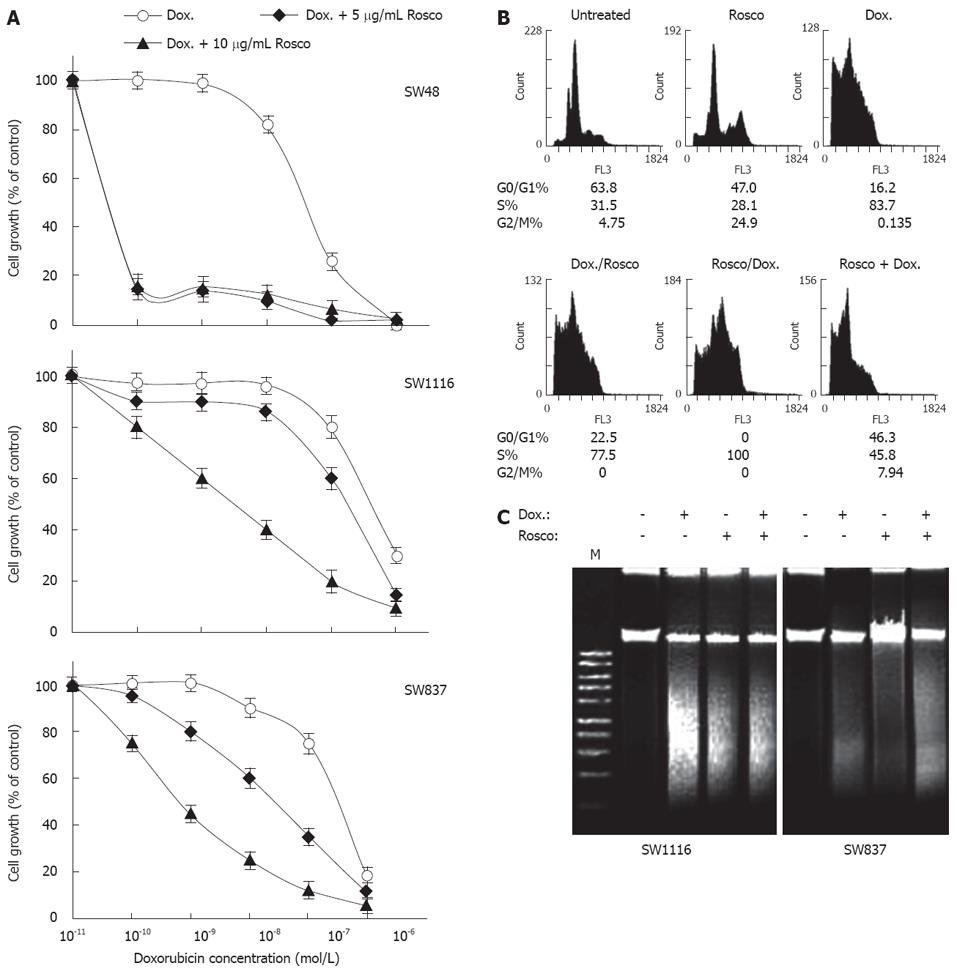Copyright
©2008 The WJG Press and Baishideng.
World J Gastroenterol. Sep 7, 2008; 14(33): 5162-5175
Published online Sep 7, 2008. doi: 10.3748/wjg.14.5162
Published online Sep 7, 2008. doi: 10.3748/wjg.14.5162
Figure 4 Potentiation of doxorubicin anticancer effect on human colorectal cancer cell lines by combination with cyclin dependent kinase inhibitor roscovitine.
A: Human colorectal cancer cell lines were treated with doxorubicin (10-11-10-6 mol/L), and the combination of doxorubicin (10-11-10-6 mol/L) plus Rosco (5 μg/mL or 10 μg/mL) for 96 h. At the end of treatment, control and drug treated cells were scored for proliferation using an MTT assay; B: Cell cycle phase distribution of human colorectal cancer cells (SW837, 5 × 105 cells/well) treated with doxorubicin (8 × 10-7 mol/L, 72 h); Rosco (15 μg/mL, 72 h); sequential combination: doxorubicin (8 × 10-7 mol/L, 24 h) followed by Rosco (15 μg/mL, 48 h); inverted sequential combination: Rosco (15 μg/mL, 24 h) followed by doxorubicin (8 × 10-7 mol/L, 48 h) and simultaneous combination: doxorubicin plus Rosco (8 × 10-7 mol/L + 15 μg/mL, 72 h) was evaluated by flow cytometry. The percentage of cells in different phases of the cycle was calculated as previously described; C: Human colorectal cancer cells, SW1116 and SW837, (5 × 105 cells/well) were treated with doxorubicin (8 × 10-7 mol/L), Rosco (15 μg/mL), and the combination of doxorubicin plus Rosco (8 × 10-7 mol/L + 15 μg/mL) for 72 h. DNA fragments were extracted and analyzed on 1% agrose gel.
- Citation: Abaza MSI, Bahman AMA, Al-Attiyah RJ. Roscovitine synergizes with conventional chemo-therapeutic drugs to induce efficient apoptosis of human colorectal cancer cells. World J Gastroenterol 2008; 14(33): 5162-5175
- URL: https://www.wjgnet.com/1007-9327/full/v14/i33/5162.htm
- DOI: https://dx.doi.org/10.3748/wjg.14.5162









